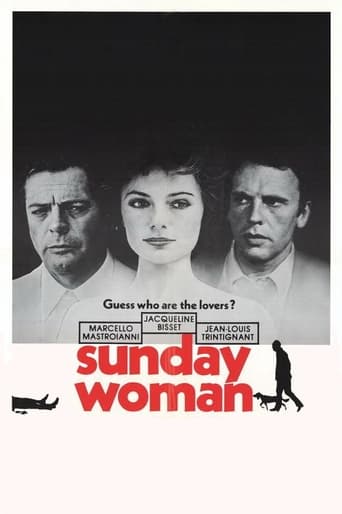gridoon2018
"The Sunday Woman" seems to have many ingredients for success: a superb (as usual) music score by Ennio Morricone, a first-rate cast (Marcello Mastroianni, Jacqueline Bisset (at her most exquisite), Jean-Louis Trintignant), and it's shot in Torino, a city rarely shown in the movies. However, the end result is rather weak. There is too much talk and not enough suspense. Part of the problem may be that nobody seems to miss the first murder victim that much, so you don't feel much urgency in discovering his killer. The film occasionally hits the mark as a social satire (e.g., the late scene of all the characters gathered at the police station accusing each other), but I still think Morricone's score is by far the best thing about it. ** out of 4.
aminatta-1
La "Donna della domenica" is definitely one of my favorite books and a great movie. Despite being built on a murder story, this movie is not a thriller. In fact, it is rather a comedy on the Torinese society, spanning from wanna-be-intellectuals to the rich and the beautiful, from rustic land owners to simple immigrants. And as a comedy, it is an exceptional one!If you are looking for suspense or you are not familiar with Italian society, you should stay away from it. Also, I recommend that you need to understand Italian very well to appreciate this movie: I checked a bit the German version/subtitles, but at least 50% of the humor gets lost in the translation...
lalisa
Books are usually better than movies from books, one may say it's a universal truth. And Fruttero&Lucentini's novel is better indeed in this case, read it for proof. But - surprise, surprise! - no bad movie at all: a bunch of excellent actors and actresses, all at ease in their roles (especially Mrs. Lina Volonghi, a great actress whose kind Italy should regret) and the feeling they are all having fun while acting (see the hilarious scene with Mastroianni among a group of prostitutes in the police station). Just good for one of those boring Sunday afternoons in winter.
Gerald A. DeLuca
"Sunday Woman" is a stylish and ribald whodunnit that has plenty of things to hold your attention when you're frankly not particularly interested in who did it or why. The murder victim is a lewd, leering, seedy old architect who makes obscene gestures at women, like a character out of Fellini's "Satyricon." His body is found bludgeoned to death by means of a large ceramic phallus. "Those who live by the sword shall die by the sword," a character in the film comments. The inspector on the case is a bemused but persistent Marcello Mastroianni. His investigations bring him in contact with some of Turin's high society: Jacqueline Bisset, the bored wife of an industrialist, and her platonic friend Jean-Louis Trintignant, a wealthy homosexual. Trintignant is himself in love with Aldo Reggiani, a records clerk who does his own investigation which leads to his own murder. The film has a nice rhythm, some well-written dialog, and makes use of fascinating Piedmontese locales in and around Turin. Mastroianni, as always, is very effective. The director, Luigi Comencini, gained a substantial reputation in the past with films like "Bread, Love and Dreams" and "Everybody Go Home!"




